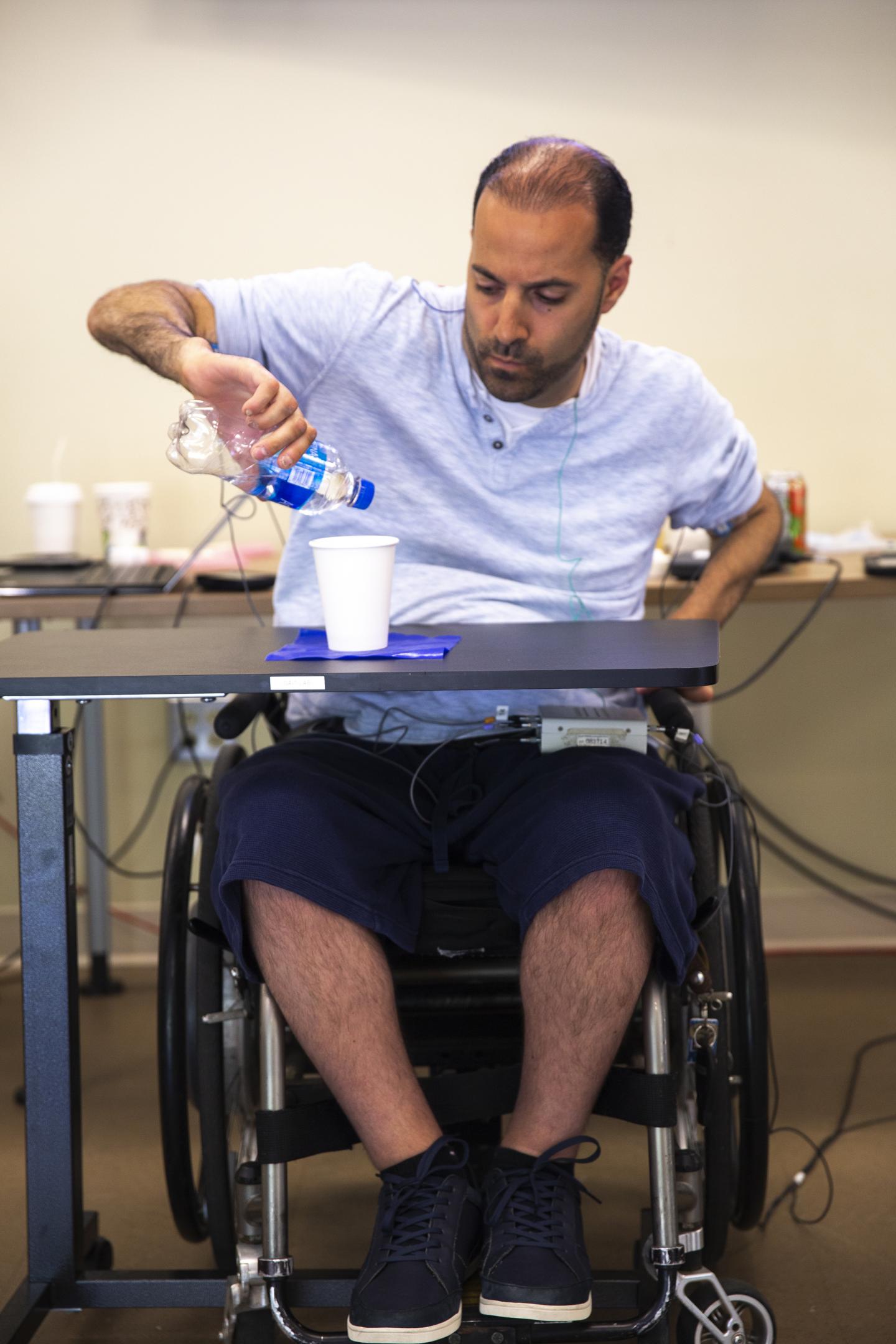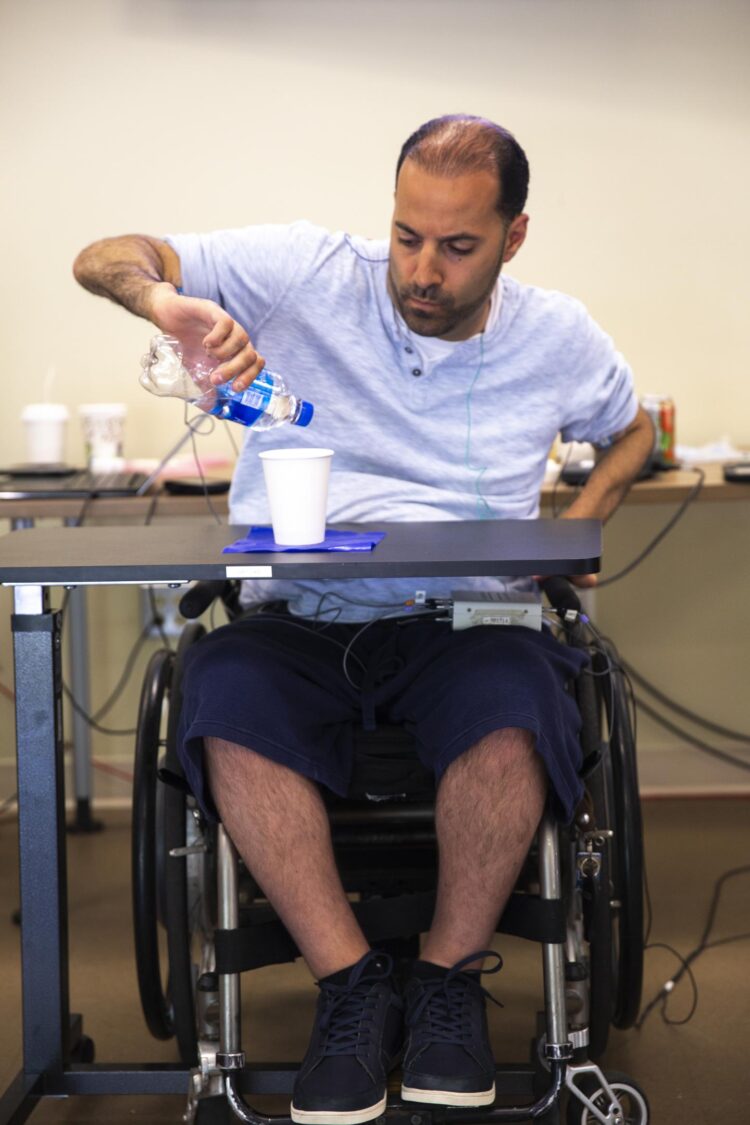Researchers at Kessler Foundation confirmed that spinal cord transcutaneous stimulation results in immediate and long-lasting gains in strength and handgrip, with positive effects evident three months post-intervention

Credit: Kessler Foundation/Jody Banks
East Hanover, NJ. March 22, 2021. Kessler Foundation researchers demonstrated that spinal cord transcutaneous stimulation (scTS) combined with hand training improves upper extremity and hand function in individuals with motor and sensory compete spinal cord injury (SCI). The study results showed immediate and long-lasting gains in strength, sensibility, and voluntary motor function.
The article, “Cervical Spinal Cord Transcutaneous Stimulation Improves Upper Extremity and Hand Function in People with Complete Tetraplegia: A Case Study” (doi: 10.1109/TNSRE.2020.3048592), was published January 28, 2021, in IEEE Transactions On Neural Systems And Rehabilitation Engineering. It is available open access at https:/
The authors are Fan Zhang, PhD, Kamyar Momeni, PhD, Arvind Ramanujam, MS, Manikandan Ravi, MS, Janelle Carnahan, PT, Steven Kirshblum, MD, and Gail F. Forrest, PhD, affiliated with the Center for Mobility and Rehabilitation Engineering Research and the Tim and Caroline Reynolds Center for Spinal Stimulation at Kessler Foundation.
For people with tetraplegia, recovering hand and upper extremity function is a top priority, as it allows them to regain the ability to perform some everyday tasks. Even a small degree of functional improvement can bring with it increased independence, vastly improving their quality of life.
While previous studies have investigated whether scTS is effective in improving upper extremity and hand function in individuals with motor complete and incomplete cervical SCI, it remained unclear whether scTS can facilitate functional restoration in an individual with motor and sensory complete tetraplegia, according to lead author Dr. Zhang, an associate research scientist at the Reynolds Center for Spinal Stimulation. Moreover, previous studies did not report follow-up testing, leaving open the question of whether scTS had long-lasting benefit.
In this case study, investigators examined the short-term and three-month post-intervention therapeutic effects of non-invasive scTS in restoring upper extremity and hand function in an individual with chronic complete cervical SCI. The study participant, a 38-year-old male who sustained his injury 15 years before study participation, received 18 scTS sessions combined with task-specific hand training over the course of 8 weeks.
Results revealed significant and long-lasting improvements in upper extremity and hand function. The total score of the Graded Redefined Assessment of Strength, Sensibility, and Prehension improved from 72/232 at baseline to 96/232 at post-intervention, and scores maintained a range from 82/232 to 86/232 during three-month follow-up without any further treatment. Bilateral handgrip force also improved by 283.4 percent in the left, dominant hand, and 30.7 percent in the right hand. These strength gains were sustained at 233.5 percent to 250 percent in the left hand and 11.5 percent to 73.1 percent in the right hand during follow-up evaluation visits.
In addition, changes in spinal motor evoked potentials (sMEP), a neurophysiological test, showed an increased level of spinal network excitability, indicating that scTS can potentially neuro-modulate the spinal network into restoring function in paralyzed limbs.
“We saw both immediate and sustained improvements on handgrip strength and motor control in this participant with complete tetraplegia,” said Dr. Zhang. “From the very first session of applying scTS, he demonstrated an immediate enhancement in grip strength.” He added, “Voluntary motor control dramatically improved within one single session, with the participant able to successfully lift a water bottle and grasp a tennis ball with stimulation enabled, neither of which were possible without stimulation.”
###
Dr. Zhang conducted this research during his postdoctoral fellowship funded by the National Institute on Disability Independent Living and Rehabilitation Research (NIDILRR). He was one of five NIDILRR fellows recognized at the 2020 Young Investigators Symposium at the 97th Annual Conference of the American Congress of Rehabilitation Medicine.
Funding sources: Tim Reynolds Foundation; National Institute on Disability, Independent Living, and Rehabilitation Research (90RE5021-01-00, ARRT 90ARHF0002
About Kessler Foundation
Kessler Foundation, a major nonprofit organization in the field of disability, is a global leader in rehabilitation research that seeks to improve cognition, mobility and long-term outcomes, including employment, for people with neurological disabilities caused by diseases and injuries of the brain and spinal cord. Kessler Foundation leads the nation in funding innovative programs that expand opportunities for employment for people with disabilities.
For more information, visit KesslerFoundation.org.
For more information, or to interview an expert, contact: Carolann Murphy, 973.324.8382, [email protected]
Media Contact
Carolann Murphy
[email protected]
Related Journal Article
http://dx.





